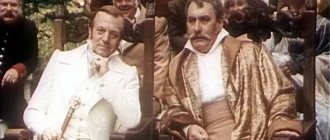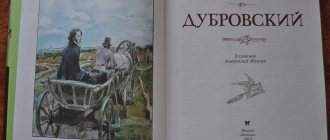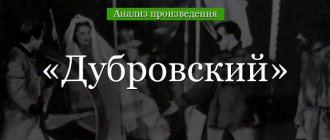Revenge of Vladimir Dubrovsky
Another argument can be made from the novel by A. S. Pushkin: Dubrovsky’s revenge. Vladimir Andreevich, having learned that his father is in an extremely difficult situation, comes to his father’s estate. Vladimir manages to spend little time with him, since Andrei Gavrilovich falls ill and dies. Then Dubrovsky decides to take revenge for the death of his father. Unlike Troekurov's revenge, which was built on selfishness and pride, Dubrovsky's revenge is based on noble thoughts. It is not for nothing that the central character of the novel “Dubrovsky” is usually called a noble robber. He takes revenge on all the rich people who are used to living with impunity. Thus, Vladimir Dubrovsky stands against the entire society.
Essay on the topic of Dubrovsky abroad
Dubrovsky Vladimir Andreevich is the main character of the unfinished novel, the “noble robber.” He was brought up in the cadet corps of St. Petersburg. Later, having become an officer, D. gets into debt. In this regard, the hero dreams of a rich bride. While in St. Petersburg, 23-year-old D. receives sad news from home: about his father’s illness and about the lawless taking of their Kistenevka estate in favor of their wealthy neighbor Kirill Troekurov. The hero goes home. Driving past Troekurov's estate, D. fondly remembers his childhood friendship with his daughter, Marya Kirillovna. At home D. finds his father dying. He takes matters into his own hands. He breaks off all relations with Troekurov, and after the death of his father, he orders his house to be burned, which, according to the court, went to the enemy. The hero, together with the peasants loyal to him, become robbers, robbing unrighteous landowners. But D. cannot forget Masha Troekurova - he is still in love with her. For Masha’s sake, the hero even forgave his enemy, Troekurov. But Troekurov betrothed his daughter to a rich old man, Prince Vereisky. Masha asks D. to kidnap her. D. is very worried, because his beloved will be the wife of a robber, although she deserves much more. With all this, in D.’s soul there is no feeling of revenge towards Troekurov. He forgave him long ago as a nobleman and a noble man. It’s just that social conditions and fate are dishonest towards D. D.'s true tragedy is that an honest Russian nobleman, attached to his home, to the thought of family, is put in a hopeless situation. There is no way for him where he could be happy. In the finale, D. loses Masha - the robbers were late, and the girl was married to Vereisky. In a battle with government troops, who had been looking for D. and his gang for a long time, the hero was wounded. He disbands his peasants, and he himself “hides abroad.” His departure is a sign not only of his personal defeat, but also of the defeat of all of Russia. All the best disappears from the country, the perpetrators of their persecution remain. The reasons for Dubrovsky's robbery. So, a hunter by vocation, Dubrovsky became a highwayman. The reason for this was Masha, Troekurov’s daughter. The fact is that Kirila Petrovich wanted to conclude a marriage between Masha and the rich Prince Vereisky that was beneficial for him. At this time, Marya had already taken a liking to the French teacher, also known as Vladimir Dubrovsky. Under the tree they made a pact together: “If you love me, put my ring in the hollow. I will know what to do and will help you." But Dubrovsky was late, and Masha entered into a marriage alliance with Prince Vereisky. Out of sadness, Dubrovsky became a robber. The Adventures of Dubrovsky the Robber. Vladimir set fire to the house where the clerks were located, and then he himself left the village of Kistenevki, which no longer belonged to him. Since then, he and a gang of other fellows began to rob people and houses, but did not touch Troekurov’s estate. He was received with honors into the house of Kirila Petrovich, introducing himself as a French teacher. Later, Vladimir organized robberies on the roads, but he persecuted only those responsible for his fate. Dubrovsky's qualities. Dubrovsky is not used to bearing insults. He could take cruel revenge on his enemies. Vladimir has a sense of camaraderie. Having caught a clerk on the road with money for an officer, he did not take this money, since he himself was once a guards officer. The nobility and kindness of Dubrovsky is also evidenced by the fact that all the residents of his father’s former estate immediately went over to his side. But he could not accept such a sacrifice. Dubrovsky is strong, brave, fearless. It is unlikely that there will be anyone who will refute these qualities in a young man. We understand that Vladimir Dubrovsky is like his father: just as honest, fair, and decent. Conclusion. If you put all of the above about Dubrovsky together, you get a very attractive image. This is exactly how A.S. Pushkin wanted to show his hero: honest, noble, brave, kind and gentle. As for us personally, having become acquainted with the life and work of the poet, we see Pushkin himself exactly like that. DUBROVSKY is the hero of A.S. Pushkin’s novel “Dubrovsky” (1832-1833). (In drafts: Andrei Zubrovsky, Ostrovsky.) Vladimir Andreevich D. is an officer, the son of a well-born but impoverished landowner. After the loss of the family estate, D., out of revenge and hatred, sets fire to the estate, goes into the forest with his peasants and becomes a robber. Having fallen in love with the daughter of the culprit of all misfortunes, Troekurov, Maria Kirilovna, D., under the guise of the French teacher Deforge, enters the house of his enemy. D. demonstrates extraordinary courage and determination: finding himself in a cage with a hungry bear (one of Troekurov’s jokes), calmly putting a pistol to the animal’s ear, he kills him, thereby winning the heart of Maria Kirilovna. But Masha agrees to run away with D. only when she is threatened with marriage to the old Prince Vereisky. As a result of an accident (which in Pushkin’s works is always full of meaning), the hero is late to free the bride before the wedding. D. with his gang attacks the carriage in which the married Masha and the prince are returning from church. Masha refuses D.'s help. In the last chapter, D. disbands the gang and goes abroad. The tradition established by V.G. Belinsky to present D. as a social hero, a chieftain of robbers or a fighter against injustice reveals a contradiction with the logic of the development of D.’s very image and actions in the plot. The apparent incompleteness of the external plot is exhausted by the completeness of D’s fate. A number of modern researchers point to this, referring by analogy to the “incompleteness” of “Eugene Onegin”. A gang of peasants robbing estates and rich travelers is not an organic environment for D. Among them, he remains an officer and master who knows how to command. Pushkin draws the reader’s attention to D.’s “mummering”. In the draft, he crosses out the word “transformed” and replaces it with the word “changed clothes.” "D. remains a contour image to the end, not acquiring the density and tangibility of a specific figure” (N. Petrunina). Book Vereisky mockingly calls D. the name of the melodramatic hero - Rinaldino. In Pushkin's narrative, the romantic image of the robber is consistently reduced. D. does not rob the French teacher, but, having entered into his position and persuaded him to sell his documents, says goodbye to him with the wishes that the Frenchman would find his mother in good health in Paris. At the station where chance brought the Frenchman and D. together, the latter arrives and leaves in a carriage. His behavior and appearance are so ordinary and not intimidating that when the caretaker, who recognized D., after his departure tells his wife who their guest was, she exclaims: “You are not afraid of God, Sidorich. Why didn’t you tell me this before, I would have at least looked at D., but now wait for him to turn around again. You are shameless, really, shameless!” D.'s image had several prototypes. Nashchokin told Pushkin about the landowner Ostrovsky, “who had a lawsuit with a neighbor for land, was forced out of the estate and, left with only the peasants, began to rob, first the clerks, then others. Pushkin knew about the case of a Nizhny Novgorod landowner (the same last name as the hero), from whom in 1802 the estate of his relative was illegally taken away. I.L. Andronikov points to a number of other possible prototypes. The typicality of the situation of unfair loss of estate allowed Pushkin to include in the text of the novel a detailed document on several pages - a court decision to take away the estate from D.'s father in favor of Troekurov. Ambition, an ardent disposition inherited from the previous generation, and impulsiveness bordering on tyranny push D. to reckless actions that turn into crimes. The destiny of young D. is hard labor or forced emigration. Pushkin was not interested in the melodramatic hero-robber, but in the fate of the Russian nobleman who became a victim of injustice.
“Why Dubrovsky breaks up with his accomplices and goes abroad”
The answer to this question: Vladimir refused to take revenge. Marya Kirilovna is irretrievably lost to him. His place of residence was discovered, clashes with soldiers began to become more frequent, and his injury prevented him from participating in battles. Vladimir was forced to hide. Dubrovsky in the true sense of the word “noble robber”. It is very important that fifth graders understand this. Pushkin’s “robbers” and their leader are much more noble than those who rule the province and “have weight” in local society. The novel "Dubrovsky" has been read. His heroes did not leave children indifferent. Their actions aroused admiration or censure and gave rise to controversy. What questions and tasks can be given to students in order to encourage them to look back at the work again and think about the fate of its characters?
It is extremely important to summarize the observations that fifth graders made while working on. pages of the work dedicated to Troekurov. Therefore, when offering to prepare an oral (or written) report, the teacher can advise students to use a plan that will facilitate the selection of material and its arrangement.
By reviewing the material of the novel in the direction suggested by the questions, fifth-graders will understand what role Troekurov plays in the ideological content of the novel. It should become clear to students that Troekurov is not just a “bad” and evil person - he embodies those qualities that were characteristic of all noble and wealthy landowners; that people like Troekurov were the support of royal power and the serf system. Pushkin openly expresses his negative attitude towards this character - both directly and with the help of the author’s characteristics (“he showed all the vices of an uneducated person”, “the ideas of a rather limited mind”, “the arrogant Troekurov”, “exuberant amusements”, etc.).
— What attitude do people have in readers who are similar to Troekurov with their conceit, selfishness, vindictiveness and callousness? - this question, completing the discussion, leads children to understand the “universal” meaning of the character of the “old Russian gentleman.”
Schoolchildren can be asked to prepare an oral story based on one of the illustrations, paying special attention to the feelings and experiences of the characters depicted in it, etc. (see “Native Literature”, questions for the entire story).
For written work in the ninth lesson, the following topics may be proposed: “What in Dubrovsky’s life evokes your sympathy?”, “What circumstances forced Dubrovsky to become a robber?” etc. These are not yet essays, but presentations with elements of reasoning, requiring good knowledge of the text, the ability to independently select material, comprehend, evaluate and motivate the behavior of the characters.
It is quite obvious that these essays need to be prepared. If, for example, the topic “What actions of Dubrovsky evoke sympathy?” is proposed, then, preparing for the presentation, we will remember with the children in the lesson what moral qualities of Dubrovsky especially attract us, we will think with them what actions, sympathetic to us, were committed by this a straightforward, noble and proud person, and we suggest, when answering the question, to pay special attention to why Dubrovsky acted this way.
Topic: “What circumstances forced Dubrovsky to become a robber?” requires drawing up a rough outline in class and then a short story based on that outline. Otherwise, students often begin to retell the text of the novel in excessive detail and go away from the topic.
The plan could be like this:
■D) The carefree life of Vladimir Dubrovsky in St. Petersburg. ■The quarrel between Andrei Gavrilovich Dubrovsky and Troekurov and its consequences for the Dubrovsky family. ■Vladimir Dubrovsky loses his father and is deprived of his estate. ■Vladimir Dubrovsky deals with corrupt judicial officials. ■Vladimir’s desire to take revenge for outraged justice. ■ The life of Vladimir Dubrovsky is “outside the law.”


